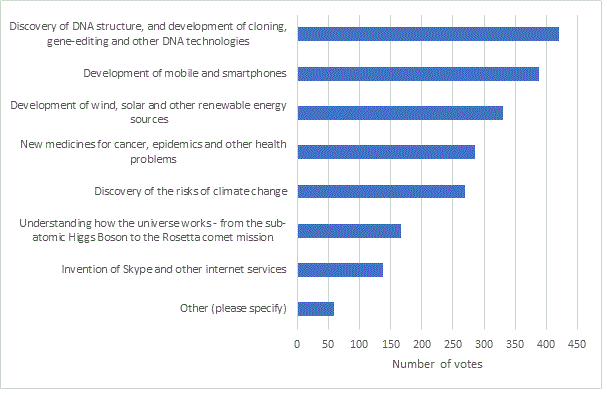Online survey names gene research as EU’s biggest breakthrough

English scientist Rosalind Franklin, co-discoverer of the structure of DNA
By any measure, Europe is a scientific powerhouse – but what has it done for us lately?
The answer, according to an online survey: unlocking the secrets of DNA. That work, from Cambridge just after the war to Berlin in the past decade, scored highest among people asked to name Europe’s biggest global ‘hit’.
As part of a collaboration with the Estonian Presidency of the Council of the European Union, Science|Business has been asking online readers what they think are the biggest contributions of Europe to science and technology. The survey – which you can still take – lists seven possible answers, from DNA to the Higgs Boson, and invites write-ins. Though not statistically significant, it gives an idea of what a science-literate audience thinks, with more than 1,000 responses since it began in July.
Here are the answers.
What do you think is Europe’s biggest contribution to science and technology?
(Online results, as of 20 August) 
1. DNA - The building blocks of life (420 votes)
Swiss chemist Freidrich Miescher was the first to discover the substance we now know as DNA. In 1869, whilst working at the University of Tübingen, Miescher was trying to identify the composition of white blood cells by examining pus on old bandages when he managed to isolate “nuclein”, essentially DNA with some attached proteins, from the cell membranes. Nearly 100 years later English scientist Rosalind Franklin took up a role at King’s College London where her expertise in X-ray diffraction led to the production of Photo 51 and other images which demonstrated that DNA has a double-helix structure. The double-helix was at that time also being modelled by University of Cambridge scientists James Watson and Francis Crick who, along with Maurice Wilkins, a pioneer of the X-ray diffraction techniques used at King’s, were later awarded the Nobel Prize for Chemistry for their work.
The discovery of the double helix triggered rapid development that continues to this day. DNA fingerprinting, developed by Alec Jefferies and his team at the University of Leicester in the mid 1980s, allows us to uniquely identify people through the patterns in their DNA. But it doesn’t stop there. Being able to manipulate the features of our DNA could be the holy grail for medical research and is already being trialled as a treatment for HIV, leukaemia, and genetic conditions such as muscular dystrophy or haemophilia.
This is where CRISPR comes in. Developed by French scientist Emmanuelle Charpentier whilst working in Sweden and Germany, CRISPR (Clustered Regularly Interspaced Short Palindromic Repeats) has recently hit the headlines for its potential to allow us to edit genomes using the same healing mechanisms that cells already use.
Of course, none of this is solely European. Watson, after all, was an American working at Cambridge. The US government’s Human Genome Project in the 1990s was the first to decode the entire human gene code. And a rival US team is contesting CRISPR’s ownership in court. But by most measures, the European contribution to genetic research has been at least equal to the American – and, according to our survey, tops other European scientific achievements.
2. Development of mobile and smartphones (388 votes)
We all know we’d be lost without our mobile phones - quite literally, given that Smartphones are now the most common way for people to find their way around. While mobile phones began in the military, the first large-scale civilian system started in Scandinavia in the late 1970s.. And, with a big push from the European Union, the subsequent GSM system became the dominant mobile phone standard around the world. Of course, the market has moved on, with former Nordic mobile giants Nokia and Ericsson much-diminished in a world dominated by Asian manufacturers. But there’s one consolation: The microchips inside 80% of all mobile phones today are designed in Britain, by ARM Holdings (since 2016, owned by Japan’s Softbank.)
3. Development of wind, solar and other renewable energy sources (330 votes)
Europeans are not just pushing forward the development of renewable energy sources, but applying them too. In 2016 almost 90% of Europe’s new power was generated by renewables, and more recently the Netherlands announced that its electric trains are 100% powered by wind energy.
4. New medicines for cancer, epidemics and other health problems (286 votes)
Many of the best healthcare systems in the world are in Europe, according to the World Health Organisation, and these are invaluably placed to deploy the new treatments being developed every day by European researchers, such as CCT245737, a drug that can overcome tumour resistance to chemotherapy from The Institute of Cancer Research, London, or the use of 3D printers to create new jaw-bones for patients by tech company Emerging Implant Technologies in Germany. Europe’s DNA research drives much of this – but there have been many other technological achievements, such as the development of monoclonal antibodies at Cambridge in the 1970s.
5. Discovery of the risks of climate change (270 votes)
Reminding us all that evidence matters, our poll showed that there are still those out there who know the importance of heeding the data. European scientists continue to champion reason in this debate. For instance, Belgian scientist Jean-Pascal van Ypersele from the Université Catholique de Louvain supports policymaking at the highest level through his work into climate change, advising the IPCC (Intergovernmental Panel for Climate Change) and contributing to the UN’s Global Sustainable Development Report. And the large army of European researchers now studying climate give vital support to policy makers intent on implementing the 2015 Paris Accord on climate change (with or without US help.)
The best of the rest
There were many other answers: 166 voted for “understanding the universe” with the Higgs Boson and related work. Another 137 picked “the invention of Skype and other Internet services.”
But there are other ways impact can be felt in science and technology; and a popular write-in comment was to recognise the importance of European work on supporting gender equality in science and the improvements this enables for research. Others suggested European contributions to human rights, the welfare state, economics and business.
What do you think? It’s not too late to vote.





 A unique international forum for public research organisations and companies to connect their external engagement with strategic interests around their R&D system.
A unique international forum for public research organisations and companies to connect their external engagement with strategic interests around their R&D system.